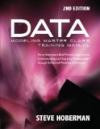 |
|
Data Modeling Master Class Training Manual 2nd Edition: Steve Hoberman's Best Practices Approach to Understanding and Applying Fundamentals Through Advanced Modeling Techniques
Steve Hoberman
Paperback. Technics Publications, LLC 2011-01-01.
ISBN 9781935504061
|
|
|
|
Hitta bokens lägsta pris
|
Förlagets beskrivning
This is the second edition of the training manual for the Data Modeling Master Class that Steve Hoberman teaches onsite and through public classes. This text can be purchased prior to attending the Master Class, the latest course schedule and detailed description can be found on Steve Hoberman's website, stevehoberman.com.
The Master Class is a complete course on requirements gathering and data modeling, containing four days of practical techniques for producing solid relational and dimensional data models. After learning the styles and steps in gathering and modeling requirements, you will apply a best practices approach to building and validating data models through the Data Model Scorecard®. You will learn not just how to build a data model, but also how to build a data model well. Challenging exercises and workshops will reinforce the material and enable you to apply these techniques in your current projects.
By the end of the course, you will know how to...Read a data model of any size and complexityValidate any data model with the Data Model Scorecard®Build relational and dimensional subject area, logical, and physical data modelsUse abstractionGather requirementsLeverage a series of templates for capturing requirementsWrite clear, complete, and correct definitions Explain the critical factors that must be in place for a successful enterprise data model TopicsPart 1: Modeling Basics. We will explain data modeling concepts and terminology. We will also explore each component on a data model and practice reading business rules. Part 2: Overview to the Data Model Scorecard®. The Scorecard is a set of ten categories for validating a data model. We will explore best practices from the perspectives of both the modeler and reviewer, and you will be provided with a template to use on your current projects.Part 3: Understanding subject area, logical, and physical data models. The subject area model captures a business need within a well-defined scope; the logical data model captures an application-independent business solution; and the physical data model captures the technical solution by focusing on factors such as performance and security. Each of these models will be explained in detail in this section. Part 4: Ensuring the model captures the requirements. We will focus on techniques such as the use of spreadsheets and business assertions to ensure the data model meets the business requirements. Part 5: Validating model scope. We will focus on techniques for validating that the scope of the requirements matches the scope of the model. If the scope of the model is greater than the requirements, we have a situation known as scope creep. If the model scope is less than the requirements, we will be leaving information out of the resulting application. Part 6: Following acceptable modeling principles. We will focus on techniques for building sound designs. Part 7: Determining the optimal use of generic concepts. We will focus on techniques for capturing the ideal use of generic concepts such as Party and Event. Part 8: Applying consistent naming standards. We will focus on techniques for applying correct and consistent naming standards. Part 9: Arranging the model for maximum understanding. We will focus on techniques for arranging the entities, data elements, and relationships to maximize readability. Part 10: Writing clear, correct, and consistent definitions. We will focus on techniques for writing useable definitions. Part 11: Matching the model with the enterprise. We will focus on techniques for ensuring the model complements the big picture. Part 12: Comparing the metadata with the data. We will focus on techniques for confirming the data elements and their rules match reality
Fler böcker av Steve Hoberman
Liknande böcker
Recensioner
Den här boken har tyvärr inte några recensioner ännu. Om du redan läst boken, skriv en recension!
Recensera boken
Skriv en recension och dela dina åsikter med andra. Försök att fokusera på bokens innehåll. Läs våra instruktioner för mer information.
Data Modeling Master Class Training Manual 2nd Edition: Steve Hoberman's Best Practices Approach to Understanding and Applying Fundamentals Through Advanced Modeling Techniques
Bokrecensioner » Data Modeling Master Class Training Manual 2nd Edition: Steve Hoberman's Best Practices Approach to Understanding and Applying Fundamentals Through Advanced Modeling Techniques
|
|
 |
 |
|
|
|
